How to Do SEO for Small Business?
Competing against a big brand can give you chills but only if you do not trust the power of SEO.
According to an article published in The Hindu, about 81% of customers and 94% of B2B purchasers conduct online research before they make a purchase (Source:The Hindu). The data shows the relevance of SEO for all kinds of businesses.
To accomplish your goal and get higher returns, it is important for your business to appear in different types of search results like Google Maps, images and videos, featured snippets, and organic results. For small businesses, budget could be a constraint but planning SEO for their business is important.
What is Small Business SEO?
Small business SEO is optimizing a business website to improve its visibility and ranking in search engine results pages (SERPs) for relevant keywords and phrases.

This includes techniques such as keyword research, on-page optimization, and link building. In addition, small business SEO aims to increase organic traffic to the website, which can lead to more leads, sales, and revenue for the business.
Read: SEO Guidebook
Difference Between Small Business SEO & Enterprise SEO?
The main difference between small business SEO and enterprise SEO is the scope and scale of the efforts.
The table mentions the basic difference between the two:
| Enterprise SEO | Small Business SEO |
| A website which has thousands of pages or more needs enterprise SEO. | Small business SEO typically involves optimizing a single website with a limited number of pages and targeting a specific geographic location and a narrow set of keywords |
| You are offering thousands of products or services. | On the other hand, you need a small business when you are offering a specific or limited amount of products or services. |
| Enterprise SEO deals with multiple websites, a global audience and a broader set of keywords. | In contrast,small business SEO typically deals with a single website and specific keywords. |
Small business focuses on local search engine optimization and building a robust online presence for a small business.
On the other hand, enterprise SEO involves optimizing many websites or web properties and targeting a global audience. Therefore, it requires a more comprehensive approach, focusing on international and local SEO, content strategy, technical SEO, and analytics. The goal is to improve the visibility and ranking of the enterprise’s websites across multiple countries, languages and industries.
Benefits of SEO for Small Business
SEO, or search engine optimization, is essential for small businesses because it helps to increase the visibility and ranking of their website in search engine results, making it more likely that potential customers will find and visit their site. This can lead to an increase in traffic, sales, and revenue. SEO can also help establish a small business as a reputable and credible source in its industry.
For example, SHEIN is a great small business SEO example before it turned the table to become popular, because:
- The brand stresses on the search trends
- Identify the highly used keywords
- Create tailored products to attract the traffic.
- It shows high social proof with several reviews to strengthen the online presence and enhance the user experience.

Let us now read the SEO benefits for small businesses.
SEO can help small businesses in the following way:
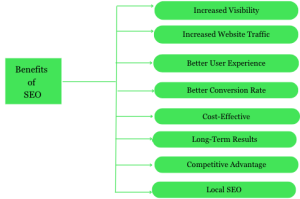
- Increased visibility: SEO helps your website rank higher in search engine results pages (SERPs), making it easier for potential customers to find your business online.
- Increased website traffic: Higher visibility often increases website traffic as more people click through to your site.
- Better user experience: SEO involves optimizing your website’s structure and content to make it easier for search engines and users to navigate, which can improve the overall user experience.
- Better conversion rates: By targeting keywords and creating relevant content, you can attract visitors more likely to convert into customers.
- Cost-effective: SEO is a relatively cost-effective way to promote your business online compared to traditional advertising methods.
- Long-term results: SEO is a long-term strategy that can continue generating results for your business over time, unlike other marketing methods that provide short-term benefits.
- Competitive advantage: You can gain a competitive advantage in your industry by ranking higher than your competitors in search engine results.
- Local SEO: If your business serves a specific geographic area, local SEO can help you target customers and increase foot traffic to your physical location.
Read: The Importance of SEO for Your Business.
SEO Strategy for Small Business
Without knowing the destination, the journey can be troublesome.Similarly, not knowing the SEO strategy can bring challenges for the small businesses. This is how you can prepare a SEO strategy for a small business:
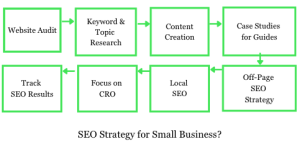
Website Audit:
Begin with the review of the website architecture, UI/UX design, and check whether the site is mobile-responsive or not?
Keyword & Topic Research:
Conduct keyword research to identify the keywords and phrases potential customers are searching for.
Content Creation:
Optimize your website’s title tags, meta descriptions, and content for those keywords. Create high-quality, original content that provides value to your target audience. Optimize your website’s images and videos with relevant file names and alt tags.
Create case studies & PDF guides:
A case study only describes an inquiry your company received from a client and the procedures you took to identify the answer that best serves their objectives. The results are summarized and quantified while your knowledge and abilities are displayed. They enable you to emphasize the advantages that your distinctive goods and/or services have brought to your customers.
Case studies demonstrate how you collaborate with your clients to discover the best solution for them. This demonstrates openness in your interactions with customers. New clients will be certain that they will receive exceptional services or products (s).
Off-Page SEO Strategy for Local Business
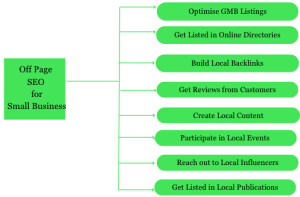
- Claim and optimize your Google My Business listing: This will help your business appear in Google Maps and the “Local Pack” search results.
- Get listed in online directories: List your business in online directories such as Yelp, Yellow Pages, and Angie’s List. Make sure your business information is consistent across all directories.
- Build local backlinks: Reach out to other local businesses and websites and ask if they would be willing to link to your website. This will help improve your website’s authority and search engine rankings.
- Get listed in local publications: Reach out to local newspapers, magazines, and blogs and ask if they would be willing to feature your business. This will help improve your website’s visibility and search engine rankings.
- Encourage customers to leave reviews: Encourage your customers to leave reviews on your Google My Business listing, Yelp, and other review sites. This will help improve your website’s visibility and search engine rankings.
- Create local content: Create relevant content for your local area and share it on your website and social media channels.
- Participate in local events: Participate in local events and sponsor local events. This will help you to increase brand awareness and attract new customers.
- Reach out to local influencers: Reach out to them and ask them to share your content on their social media channels. This will help you reach a larger audience and improve your website’s visibility.
Focus on CRO (Conversion Rate Optimization)
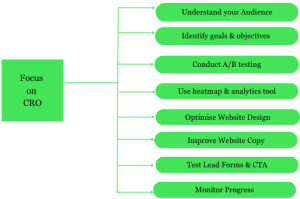
- Understand your audience: Start with conducting research to understand your target audience’s requirements, pain points, and behavior.
- Identify goals and objectives: Define the goals and objectives of your website or landing page and use them to guide your CRO efforts.
- Conduct A/B testing: Use A/B testing to try out different variations of your website or landing page and see which one performs better.
- Use heatmap and analytics tools: Use tools like heatmap and analytics to understand how users interact with your website or landing page and identify areas for improvement.
- Optimize your website’s design: Make sure your website’s design is visually appealing, easy to navigate and loads fast.
- Improve your website’s copy: Make sure your website’s copy is clear, concise, and persuasive.
- Test your forms and calls to action: Test versions of your forms and calls to action to see which ones perform best.
- Monitor your progress: Regularly monitor your progress and continue to make adjustments to improve your website’s conversion rate.
Track SEO results
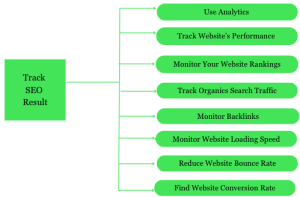
- Use Analytics: Use Google Analytics to track the number of visitors to your website, their behaviour, and the sources of their traffic.
- Track website’s performance: Use Google Search Console to track your website’s performance in search engine results, including the keywords that are driving traffic to your site, the click-through rate (CTR), and the average position of your website in search results.
- Monitor your website’s rankings: Use tools like Ahrefs, SEMrush or SERPstat to monitor your website’s rankings for specific keywords and track the changes over time.
- Track organic search traffic: Track the number of organic search visitors to your website and monitor the changes over time.
- Monitor your backlinks: Use a tool like Ahrefs or SEMrush to track the number and quality of backlinks to your website and monitor the changes over time.
- Monitor your website’s loading speed: Use a tool like GTmetrix or Google’s PageSpeed Insights to track your website’s loading speed and identify areas for improvement.
- Reduce the website’s bounce rate: Use Google Analytics to monitor the bounce rate of your website, which is the percentage of visitors who leave your site after only viewing one page.
- Find website’s conversion rate: Use tools like Google Analytics or Hotjar to track your website’s conversion rate, which is the percentage of visitors who take a desired action on your site.
Bonus SEO Tips for Small Business Websites
Whether you are a seasoned business player or new to the industry, choosing SEO is a part of the game.
In 2022, only 63% of small businesses invest in SEO despite knowing its long term benefits. And of these, 40% of small businesses use in-house SEO software and tools instead of hiring a third-party.
If you are not confident and feel that you require SEO, these are some additional SEO tips for small business websites:
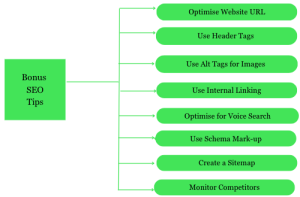
- Optimise your website’s URLs: Use clear, concise, and keyword-rich URLs to make it easier for search engines and users to understand the content of your pages.
- Use header tags correctly: Use header tags (H1, H2, H3, etc.) to structure your content and make it easier for search engines to understand the main topics of your pages.
- Use alt tags for images: Use alt tags to describe the images on your website and make it easier for search engines to understand the context of the images.
- Use internal linking: Use internal linking to link related pages on your website and help search engines and users navigate your site.
- Optimise for voice search: Optimize your website’s content for voice search by including long-tail keywords and natural language phrases.
- Use schema markup: Use schema markup to give search engines more information about your business and its content, such as your business’s location, phone number, and opening hours.
- Create a sitemap: Create a sitemap and submit it to Google Search Console to help search engines discover and index your website’s pages.
- Monitor your competitors: Monitor your competitors’ SEO strategies and identify areas where you can improve your strategy.
Final Words
It’s pointless to spend time and money creating a beautiful website if your clients can’t locate it. But how can you differentiate your website from the vast amount of online content?
When users search on Google, Bing, or Yahoo, you may make it easier for them to locate your website by using search engine optimization (SEO). You may increase traffic to your page and sales by building your website correctly and optimizing your keywords. For help on generating the potential leads, you can connect with us.
FAQ’s
Is SEO worth it for small businesses?
Yes, SEO is worth it for small businesses as it increases the chances of ranking on Google and improves the visibility. It is important the small businesses understand the SEO requirement of SEO and hire an SEO agency to help them attain the business results.
Can I do SEO by myself?
Yes you can do but at times being occupied with other responsibilities can take away your attention. It is better to outsource an SEO agency as they are able to take advantage of the greatest resources, tools, and tactics to keep up with SEO’s evolving environment. You can concentrate on other aspects of your business by outsourcing your work to a corporation.
How much does SEO cost for a small business?
Though it depends on the type of business The average cost of SEO for small businesses is USD 750 to USD 2000 per month.



